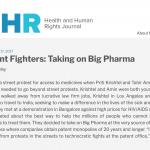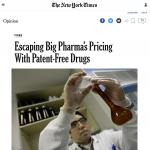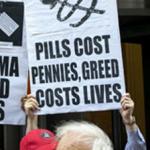This article by PFAM coordinator Fran Quigley was published in the Health and Human Rights Journal. To see the article at its original source, with reference sources hyperlinked, click here.
On July 18, 2017, the New York Times published PFAM founder, Fran Quigley, in its opinion page entitled "Fixes". In the article, Quigley covers the Zika virus, neglected diseases, and what is being done to alter the status quo. Below is a couple of snippets, but follow this link to read the rest of the article!
See the video folks, the President has said it himself. Although this is a clip from the campaign trail, Donald Trump, as a presidential candidate, called out the pharmaceutical industry. Mr. President, it's been almost half a year into your term as President and Pharma is still getting away with murder.
Drug prices are skyrocketing in the US, and eye-watering Big Pharma profits are rising right along with them. With millions of Americans skipping medicine doses due to cost, widespread public frustration has spurred lawmakers to propose some good ideas for addressing the crisis.
During the January 2003 State of the Union address, President George W. Bush announced the President’s Emergency Plan for AIDS Relief, a landmark treatment program. As Bush spoke, the cameras panned to a smiling guest of honor standing to the right of First Lady Laura Bush. The guest was Ugandan physician Dr. Peter Mugyenyi, and he was an illegal importer of medicines.
The pharmaceutical industry has a massive public relations problem, and it knows it. Even an unapologetically pro-corporate President says drug companies are “getting away with murder.” Americans name prescription drug prices as a top concern, and a January poll showed only 9% of people in the U.S. feel that those companies prioritize patients over profits.
Are cleverly-branded fishing hats, stuffed animals, and fancy dinners to blame for the U.S.’s raging opioid and heroin epidemic?
Most of us know the breathtaking scope of that epidemic. People are dying of overdoses at a higher rate than ever in our history, nearly 80 deaths every single day. With four of every five heroin users tracing their addiction back to opioids, many of us likely know a loved one or neighbor touched by this tragedy.
Have you heard the old saying that, if you look around a poker table and can’t figure out who is the sucker, then the sucker is you?
When it comes to the current medicines system, it is time for us taxpayers to take a good look: we are the suckers in this game. Taxpayers pay for the research to discover medicines we need, which is great. What is not great is that we then hand over monopoly rights to those medicines to corporations, which turn around and charge us taxpayers and our governments sky-high prices for the very same medicines we paid to discover.
The Altiero Spinelli building of the European Parliament in downtown Brussels exudes modernity. Its steel-and-glass structure houses high-ceilinged hearing rooms with perfect lighting, blonde wood, and state-of-the-art audio and video technology. These spaces seem to embody technocratic competence and calm deliberation, but on a chilly afternoon last December, one of these hearing rooms was the setting for a scathing denunciation of the global system for developing and distributing medicine.
Enormous public frustration with the skyrocketing prices of essential medicines in the US has not yet led to any meaningful reform. But a historic initiative on the November ballot in California, championed by health care and consumer advocates and fiercely opposed by multinational drug corporations, may finally rein in Big Pharma.
Don Reichmuth survived prostate cancer once before, back in 2007, so his physician was concerned when tests recently revealed the cancer had returned. Reichmuth's physician prescribed a drug called enzalutamide, marketed by the Japanese company Astellas Pharma, Inc. under the brand name Xtandi. But when the physician sent the prescription to the pharmacy, the managers of Reichmuth's insurance plan sent back an immediate refusal to approve it.
Reichmuth, a retired teacher who lives in Washington State, was puzzled by the logic. Then he learned the price of the Xtandi prescription: over $9,700 each month.
For most of human history, life-saving drugs were a public good. Now they’re only good for shareholders.
Along the path toward the creation of a global capitalist system, some of the most significant steps were taken by the English enclosure movement.
Between the 15th and 19th centuries, the rich and the powerful fenced off commonly held land and transformed it into private property. Land switched from a source of subsistence to a source of profit, and small farmers were relegated to wage laborers. In Das Kapital, Marx described the process by coining the term land-grabbing. To British historian E.P. Thompson, it was “a plain enough case of class robbery.”











